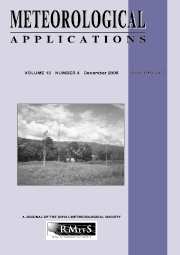Article contents
Decision-maker expectations and the value of climate prediction information: conceptual considerations and preliminary evidence
Published online by Cambridge University Press: 17 May 2001
Abstract
This paper examines the commonly used assumption that decision-makers possess accurate prior probability information about climate events that affect their well-being, and illustrates the impact of that assumption on the valuation of prediction information. A survey of large producers in the Mid-western United States is used to recover their prior beliefs about climate variables. It is found that producers systematically misrepresent the probabilities of climate events that materially affect their well-being. In particular, the most common form of the miscalibration between actual and subjective probabilities is to overstate the likelihood of adverse events and understate the likelihood of favourable events. As a result, common methods for valuing prediction information are likely to understate the true value when recipients begin with less accurate prior beliefs.
Information
- Type
- Research Article
- Information
- Copyright
- © 2000 Royal Meteorological Society
- 8
- Cited by

